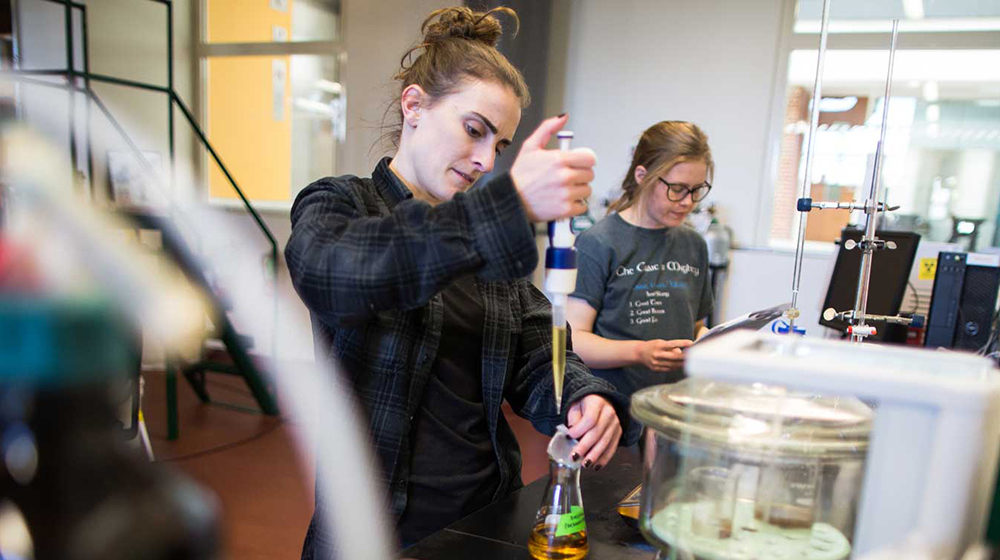Biodiesel Production
Biodiesel can be made from any vegetable oil or animal fat through a chemical reaction called transesterification. Through this chemical reaction, long hydrocarbon chain (fatty acids) can be isolated, and later refined, to create a biodegradable, non-toxic, non-flammable, drop-in replacement for petroleum diesel fuel.
Loyola students are hard at work developing a Zero Waste Production Process while producing biodiesel for sale and maintaining the highest product quality. Additionally, the Searle Biodiesel Lab serves as a resource center for other education programs and small-scale biodiesel producers.

Sustainability
Waste Makes Haste
Learn how Loyola students are turning used cooking oil into bus fuel in their efforts
Read MoreBiodiesel Fuel
Renewable Fuel made from Waste Cooking Oil
Biodiesel is a renewable replacement for petroleum diesel fuel that drastically reduces emissions. It works in most diesel engine applications with little (or no) modifications/changes to how you use your engine. Our student-run business has been producing biodiesel since 2007.
See how our Biodiesel Production happens as part of Loyola's Zero Waste Process.
| Emission Type | B100 | B20 |
|---|---|---|
| Total Unburned Hydrocarbons | -67% | -20% |
| Carbon Monoxide | -48% | -12% |
| Particulate Matter | -47% | -12% |
| NOx | +10% | -2% - +2% |
| Sulfates | -100% | -20% |
| PAH (Polycyclic Aromatic Hydrocarbons) | -80% | -13% |
| Ozone Potential | -50% | -10% |
www.epa.gov/otaq/models/analysis/biodsl/p02001.pdf
Loyola sells 100% biodiesel that our students make from waste cooking oil collected from cafeterias on campus (and from donations from all around Chicago). Our fuel is available for sale in bulk quantities (55–500 gallons) and ready to be used on its own or blended with petroleum diesel fuel. We are proud to use this fuel on our own campus in our shuttle buses and a boiler in the School of Environmental Sustainability.
The Loyola Biodiesel Program is fully licensed to produce and sell fuel. That means that all of the applicable fuel taxes are paid to; our process is reviewed/audited for safety; and our finished fuel is tested for and meets all industry specifications for quality (ASTM D6751). We test our fuel in our own fuel quality laboratory and confirm this with external (third party) lab tests as well.
Zero Waste Process
Producing Truly Sustainable Fuel
Our goal is to operate a zero waste biodiesel production process. We have developed and implemented a number of process innovations since we started producing biodiesel in 2007. This chart shows our current production process and how we implement a life-cycle design for our operations.
Students in the lab continue to research and develop innovative solutions to dealing with our byproducts, conserving/producing energy, and producing new products. Here are some of the current projects Loyola students are working on:
| Project | Description |
|---|---|
| Algae for Fish Food | Exploring the potential to grow algae in our treated wash water to simultaneously improve water quality and grow harvestable biomass that can be used as fish food in our Aquaponics Systems. |
| Rainwater Utilization | Tracking and optimizing the rainwater system in IES with the goal of maximizing rainwater utilization and expanding its use to the Searle Biodiesel Lab. |
| Operations Database | Designing a custom operational database that combines research, production, and finances into a single platform to improve efficiency in the lab. BONUS: We are going paperless! |
| Multipurpose Soap | Developing a multipurpose soap that utilizes glycerin from the biodiesel production process. The second product in our BioSoap product line. |
| Glycerin Purification | Implementing best practices and additional treatment steps to increase glycerin purity (better soaps), recover organic liquids (more biodiesel), and recover valuable nutrients (new fertilizer product in development). |
| Water Remediation | Testing and implementing bioremediation techniques to treat waste water generated from the biodiesel production process. |
Chemical Analysis
Product Quality Control and Research
The Searle Biodiesel Program includes an extensive chemical analytics lab that allows our students to test all of our fuel to ensure it meets the highest quality standards. We use industry standard equipment, peer reviewed procedures, and cross check our results with an external (third party) lab for accuracy. This equipment also allows us to perform research, test our BioSoap, and offer some testing services to other schools making biodiesel.
We perform a suite of critical tests on every batch of biodiesel before it goes to our customers, including:
| Test | Result |
|---|---|
| Free Glycerin | High levels indicate incomplete purification |
| Total Glycerin | High levels indicate an incomplete chemical reaction |
| Water Content | High levels indicate incomplete fuel drying or improper storage |
| Oxidation Stability | Low results point to a reduced shelf life |
| Cloud Point | Results guide safe biodiesel use in cold temperatures |
| Cold Soak Filtration | High results indicate poor cold weather performance |
| Visual inspection | Excellent indicator of approximate water content or contamination |
We also perform additional tests as part of our quality control and research protocols:
- Test
- Density
- Kinematic Viscosity
- Methanol Content
- Acid Number
- Flash Point
- Sulfur Content
- Sulfated Ash Content
Resources
Find support for lesson plans, learn how to use our biodiesel production calculator, or learn more about the mobile biodiesel processor through our biodiesel production resources.
Biodiesel can be made from any vegetable oil or animal fat through a chemical reaction called transesterification. Through this chemical reaction, long hydrocarbon chain (fatty acids) can be isolated, and later refined, to create a biodegradable, non-toxic, non-flammable, drop-in replacement for petroleum diesel fuel.
Loyola students are hard at work developing a Zero Waste Production Process while producing biodiesel for sale and maintaining the highest product quality. Additionally, the Searle Biodiesel Lab serves as a resource center for other education programs and small-scale biodiesel producers.
